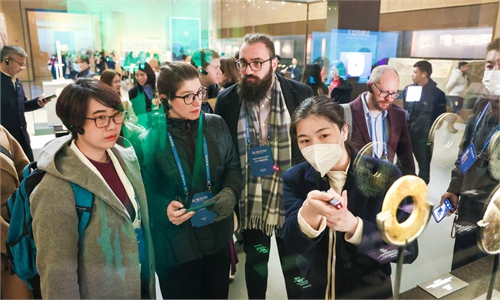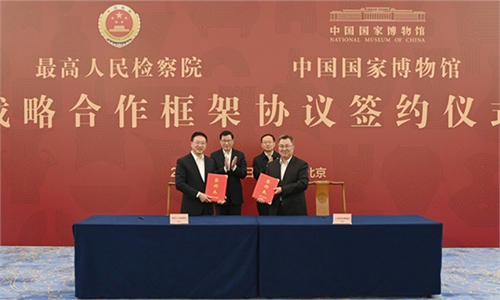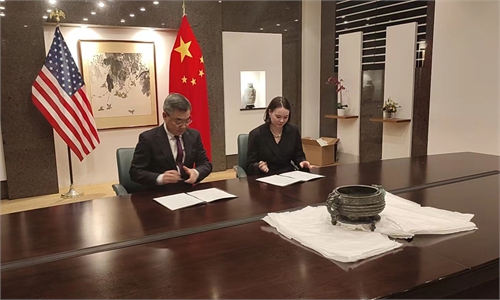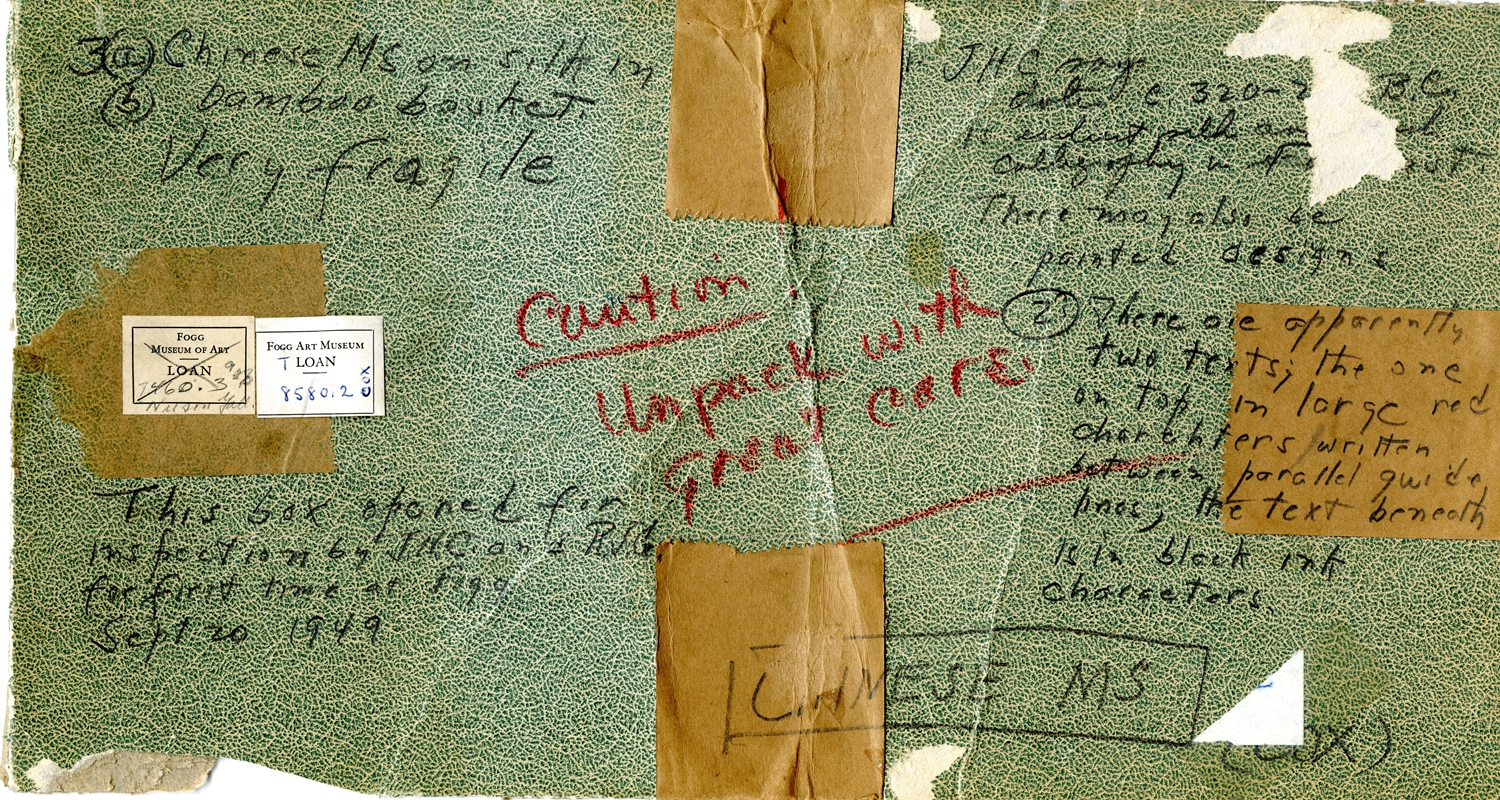
The physical evidence of the circulation of the Zidanku Silk Manuscripts Photo: Courtesy of the National Cultural Heritage Administration
China on Thursday launched a recommendation for the protection and return of cultural objects removed from colonial contexts or acquired by other unjustifiable or unethical means, winning a big applause from many countries which are seeking for more cooperation in solving this serious problem. Marble columns from Yuanmingyuan (or the Old Summer Palace), which were repatriated from Norway, are on display at Zhengjue Temple of Yuanmingyuan Ruins Park in Beijing. Photo: IC
The Qingdao Recommendations for the Protection and Return of Cultural Objects Removed from Colonial Contexts or Acquired by Other Unjustifiable or Unethical Means (Qingdao Recommendations) was launched during the International Conference on the Protection and Return of Cultural Objects Removed from Colonial Contexts, a supporting event of the 2nd Council Meeting of the Alliance for Cultural Heritage in Asia (ACHA) that was held on Thursday in Qingdao, East China's Shandong Province.
Experts from both China and aboard stated that the release of the Qingdao Recommendations is in line with the international trend of global cultural dialogue and cooperation, and also demonstrates that China is taking an important role in the decolonization of museums and the return of cultural relics obtained through colonialism or other unjust and immoral means.
Set an example
According to China's National Cultural Heritage Administration (NCHA), the Qingdao Recommendations calls on all countries to engage in open and inclusive international dialogue to facilitate the return of cultural relics to their countries of origin, beyond the scope of existing international conventions, in order to strengthen social cohesion and the intergenerational transmission of cultural heritage.
It encourages innovation and enrichment in the modes of protection and return of cultural relics lost or obtained through other unjust and immoral means under colonialism, through various forms such as diplomacy, judiciary, and donations, and explores international solutions for the protection and return of specific historical cultural relics, according to China's National Cultural Heritage Administration.
Huo Zhengxin, a law professor at the China University of Political Science and Law who delivered a report to the conference about the drafting of the Qingdao Recommendations, told the Global Times that the drafting of the recommendation began in February 2024, and after eight rounds of discussion and revision based on preliminary research and the summary of practical experience, the first draft of the proposal was completed. After consulting with relevant international experts and widely soliciting opinions from the ACHA and other representatives, the final draft was formed by fully absorbing and synthesizing the opinions and suggestions from all parties.
He said the recommendation is an important initiative to implement the China-proposed Global Civilization Initiative and promote the construction of a community of shared future for mankind. It puts forward specific methods and suggestions for dealing with cultural relics that were lost or obtained through other unjust and immoral means under colonialism, forming a fair, scientific, balanced and sustainable solution to the protection and return of such relics.
Many representatives from participating countries of the ACHA, including Honduras, Sri Lanka and Armenia, told the Global Times that this recommendation is significant in dealing with the lost relics overseas due to wars and some illegal means.
"The return of lost cultural heritage is worthy of international attention and is a powerful means of decolonization," Gloria Annarella Velez Osejo, minister of Culture, Arts, and Heritage of Honduras, told the Global Times on the sidelines of the conference. She noted that China has done a great job in tracing the lost cultural relics overseas. Honduras as a new partner state of the ACHA expects more cultural dialogues like this conference for better protection of the cultural heritage of all humanity.
Juude Nilan Cooray, a cultural official from Sri Lanka, told the Global Times he would take the Qingdao Recommendations as a good example and take the experience back to his mother country as Sri Lanka is currently also issuing some lost cultural relics with the Netherlands.
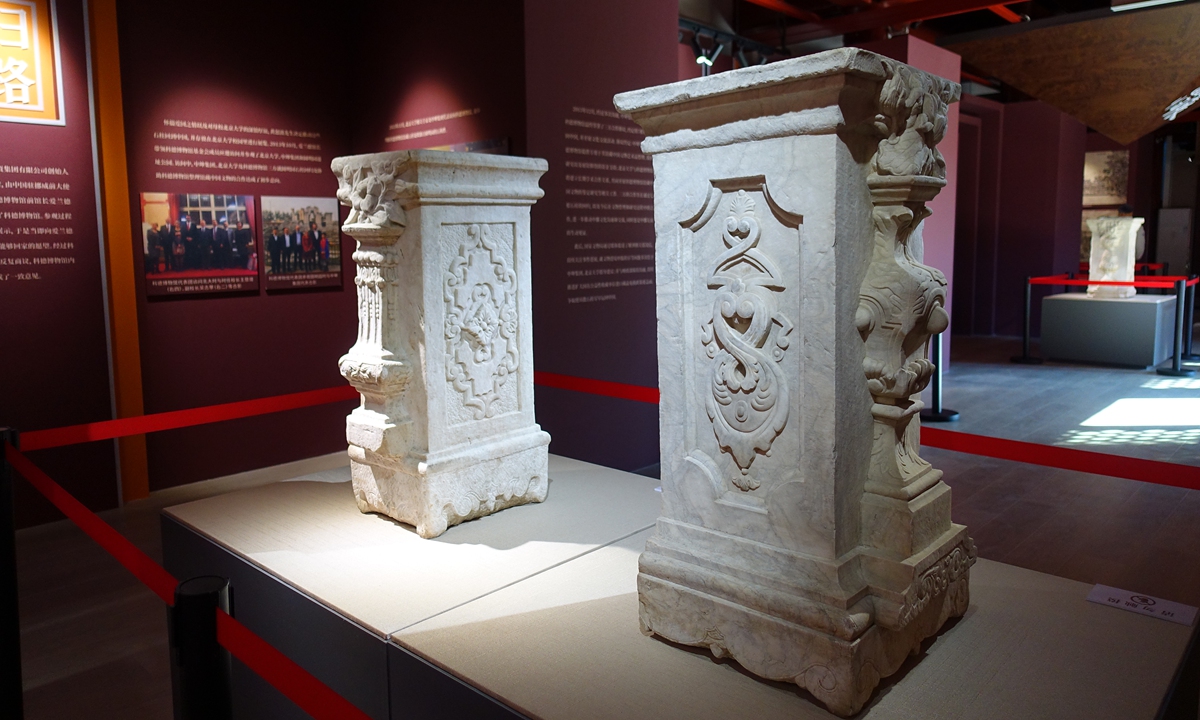
One of the highlights of the conference is that many scholars and heads of relevant cultural and museum institutions from the UK, the US, Norway and Germany that collect the lost cultural relics also made an active voice in supporting the movement.
They shared their practices and understandings on the research of the origin of cultural relics, international cooperation in protection, and return.
"Talking about the UK where I'm from, I have seen over the last few years, much more openness in the British public to give things back and to acknowledge the role of colonialism, the role of the empire, not just within the countries where these pieces come from, but also the pieces themselves and how they were removed from their own context," Olivia Whitting, head of Cultural Heritage at the Art Loss Register, told the Global Times on Thursday.
At the meeting, professor Donald John Harper from the University of Chicago and officials from NCHA held a handover ceremony for the physical evidence of the circulation of the Zidanku Silk Manuscripts, an ancient document date back to the Chu state of the Warring States Period (475BC-221BC) and were lost in the US. This piece of evidence is the outer packaging box cover that once contained the fragments of the Zidanku Silk Manuscripts.
Lothar von Falkenhausen, a professor from the Cotsen Institute of Archaeology at the University of California, Los Angeles, and Harper also made speeches on this topic of cultural relics at the meeting, expressing their wish to return the relics back to China.
Harper said he regards the move as a "good cultural diplomacy" between China and the US.

